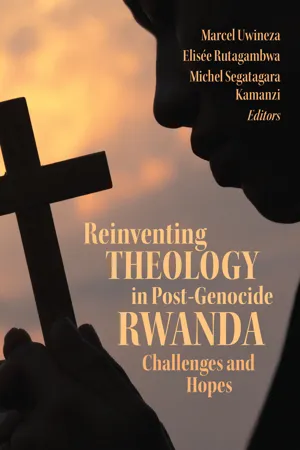
Reinventing Theology in Post-Genocide Rwanda
Challenges and Hopes
- 416 pages
- English
- ePUB (mobile friendly)
- Available on iOS & Android
Reinventing Theology in Post-Genocide Rwanda
Challenges and Hopes
About this book
The first comprehensive examination of the Catholic Church’s role in the genocide against the Tutsi and its attempts at reconciliation
From April to July 1994, more than a million people were killed during the genocide against the Tutsi in Rwanda. Tutsi men, women, and children were slaughtered by Hutu extremists in churches and school buildings, and their lifeless bodies were left rotting in these sacred places under the deep silence of church authorities. Pope Francis’s apology more than twenty years later presents the opportunity to reimagine the essence of the Church, the missionary enterprise, theology in its multiple dimensions, the purification of memory, and the place of human dignity in the Catholic faith.
Reinventing Theology in Post-Genocide Rwanda critically examines the Church’s responsibility in Rwanda’s tragic history and opens the dialogue to construct a new theology. Contributors to this volume offer moving personal testimonies of their journeys to reconciling the evil that has marred the Church’s image: bystanders’ indifference to the suffering, despite their claim as members of the Church.
The first volume of its kind, Reinventing Theology in Post-Genocide Rwanda is a necessary step toward the Rwandan Catholic Church and humanity’s restoration of fundamental peace and lasting reconciliation. Catholic clergy, lay people, and human rights advocates will benefit from this examination of ecclesial moral failure and subsequent reconciliatory efforts.
Frequently asked questions
- Essential is ideal for learners and professionals who enjoy exploring a wide range of subjects. Access the Essential Library with 800,000+ trusted titles and best-sellers across business, personal growth, and the humanities. Includes unlimited reading time and Standard Read Aloud voice.
- Complete: Perfect for advanced learners and researchers needing full, unrestricted access. Unlock 1.4M+ books across hundreds of subjects, including academic and specialized titles. The Complete Plan also includes advanced features like Premium Read Aloud and Research Assistant.
Please note we cannot support devices running on iOS 13 and Android 7 or earlier. Learn more about using the app.
Information
Table of contents
- Cover
- Half Title
- Title Page
- Copyright
- Dedication
- Contents
- Foreword
- Acknowledgments
- Outline of the History of Rwanda
- Introduction
- 1 The Problematic History of Rwanda: What Made the Genocide against the Tutsi Possible?
- 2 Genocide against the Tutsi in Rwanda and the Jews in Europe
- 3 Values and Faith-Based Education in Catholic Schools in Rwanda
- 4 The Role of the Church in the Process of Reconciliation in Rwanda
- 5 “The Temple of His Body” (Jn 2:21): Rediscovering Churches and Human Beings as Sacred Spaces
- 6 A Pauline Foundation for Social Reconciliation
- 7 From Divine Trust to Human Responsibility
- 8 Luke-Acts on the Primacy of Faith over Evil Commands: Relevance for Post-Genocide Rwanda
- 9 Responsibilities of Theology in Post-Genocide Rwanda
- 10 Learning from a Tragedy: Toward a New Evangelization in Africa after the Genocide in Rwanda
- 11 A Theology of Suffering in Post-Genocide Rwanda
- 12 The God-Question: Sacramental Theology in Post-Genocide Rwanda
- 13 The Formation of the Clergy in the Current Context of Rwanda’s Church
- 14 Being a Priest in Post-Genocide Rwanda: A Witness to Truth, Goodness, and Love
- 15 Remembering Genocide
- 16 Remembering Our Shared Humanity: Reaffirming Human Rights
- 17 Bias, Conversion, and Recognition in Post-Genocide Rwanda
- 18 Rethinking Genuine Leadership through the Prism of the Ethics of Apology
- 19 The Religious and Secular Leadership We Need in Post-Genocide Rwanda
- 20 Post-Conflict Reconciliation and Reconstruction: Three Models of Prophetic Leadership in Great Lakes, Africa
- 21 Jesuits Killed at Centre Christus: C. Mahame, P. Gahizi, and I. Rutagambwa
- 22 Construction of Collective Memory: Rwanda’s Memorialization
- 23 The Role of Visionary Leadership by Women in Post-Genocide Rwanda
- 24 The Invisible Hand: Twenty-Five Years of Miracles Seen and Unseen in Rwanda
- Conclusion
- About the Editors
- About the Contributors
- Index